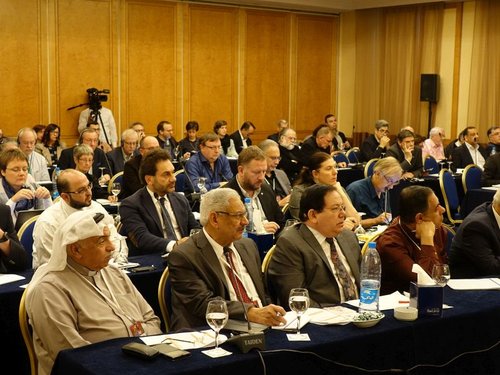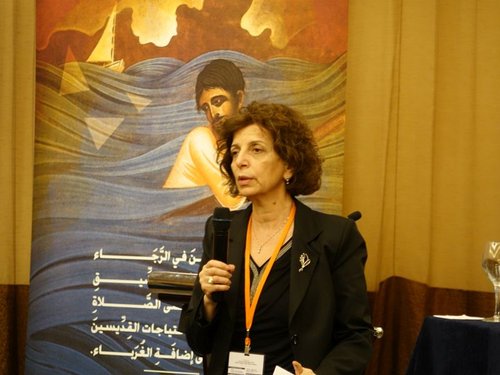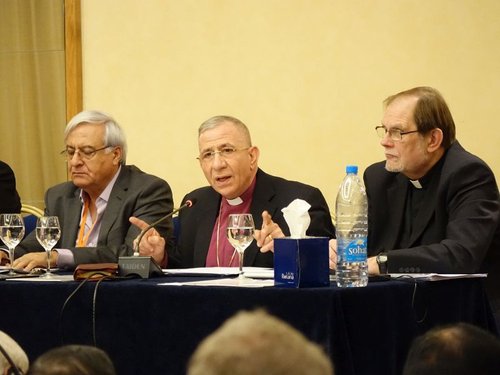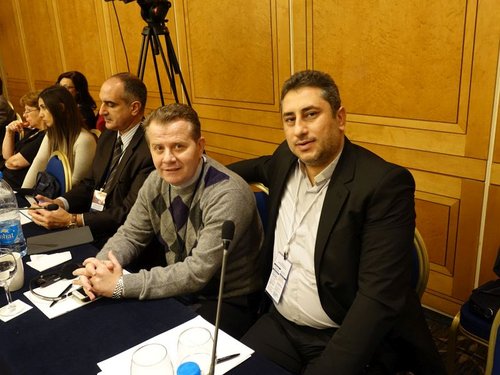Building Bridges Between East and West
2016. november 27., vasárnapRCH Ecumenical Officer, and Co-moderator of WCRC Europe’s Task Force on Migration and Refugee, Balázs Ódor, recently attended a conference in Lebanon with the Fellowship of the Middle East Evangelical Churches. It is FMEEC’s third International Conference on Evangelicals and Christian Presence in the East, seeking to bring churches from the East and the West together. Questions of a Cross-regional approach of reformed Churches to Migration were part of the discussions.
November 22-26 saw Christians from around the world gathering in Beirut, Lebanon for the Fellowship of the Middle East Evangelical Churches (FMEEC) third International Conference on Evangelicals and Christian Presence in the East. The conference served as a gathering to emphasize the necessity of an open dialogue between the East and West, while finding ways for Evangelicals to play a role in this due to common linkages with both eastern Christian and Muslims, as well as with the West.

The conference saw participants from 17 countries
Balázs Ódor, RCH Ecumenical Officer, was in attendance in three roles: representing the RCH and the Global Ministries in these discussions and also representing the World Communion of Reformed Churches (WCRC) Europe Area as the Moderator of the WCRC Task Force on Flight and Migration. This trip was an important step for the Central European and the wider European church to show solidarity with fellow churches in the Middle East.
The WCRC Europe Area Task Force on Flight and Migration was established in April 2016 at the request of the Council of the European Area of WCRC. The group has met twice since its founding in order to formulate its position on Flight and Migration. The Task Force is committed to supporting member churches in deepening their theological reflections on migration, engaging in a dialogue about Christian-Muslim relations, partnering with Middle East churches, sharing best practices from various contexts, and doing all of these things through concrete actions of solidarity.
The RCH feels a deep responsibility to advocate on behalf of persecuted Christians living in the Middle East and this conference was a timely reminder of that commitment. According to the Statement of the General Convent on the European Migration Crisis, “We must recognize and declare that the root causes for this unprecedented rate of migration are social, economic, political and civilization crises as well as the persecution of Christians,” and, “we must help those who are practicing Christianity and those of other faiths.”

Protestant Churches and Muslim communities from the region and Western partners were equally represented
According to FMEEC, “In view of our historical role as Evangelicals, always aiming to bridge distances on all levels between the various components of our society, and between the East and the West, AND, in order to encourage mutual understanding and concord amongst all these components, we intend – in this third conference -- to emphasize the necessity of dialogue between East and West and to highlight the importance of this dialogue.”

Rosangela Jarjour, General Secretary of FMEEC
In light of this, the conference focused on two questions: 1) How do we perceive each other as Easterners and Westerners, and 2) How do we perceive the impact of Western policies on Christian presence in the East? In response, attendees at the conference discussed a plethora of issues, including an analytical reading of Christian-Christian and Christian-Muslim relationships based on the findings of previous FMEEC conferences, an analytical and critical reading of the way the West perceives the East and the East perceives the West, and a critical analysis of the “double standards” by which the West judges the East, and the East judges the West, explained Rosangela Jarjour, General Secretary of FMEEC. Also discussed was the role of Evangelicals in building bridges between East and West, as well as the positive and negative role of the media and how it influences East-West relations.

Chris Ferguson of WCRC was also in attendance
In addition to participating in this conference, Balázs Ódor also attended field visits to partners in the area alongside Matthias Herren of Swiss Interchurch Aid (HEKS) including meeting with Rev. Mgo Karageozian president of the Union of Armenian Evangelical Church in the Near East (UAECNE). They visited local churches and church-affiliated projects in order to deepen their understanding of the situation of churches in Lebanon and Syria. Their visit included the Afternoon School project for Syrian refugees operated by UAECNE. Discussions with Rev. Joseph Kassab, General Secretary and Dr. Johnny Awwad, head of the Executive committee on pedagogical and educational affairs of the Near East National Evangelical Synod in Syria and Lebanon (NESSLE) provided further evidences of the importance of Evangelical witness and peacebuilding between Christians and Muslims through education for the societies of both countries. During their trip, the two gained perspectives for deeper cooperation in the future between churches in the East and West, including RCH and the Hungarian Reformed Church Aid.

Evangelical pastors from Syria reported about the worsening situtation
RCH is thankful for all its partners, especially HEKS and the Global Ministries of the the United Church of Christ and the Disciples of Christ which facilitate the connection and encourage the commitment of RCH in the Middle East.
Article by Kearstin Bailey
Photos: Badih Koudmani, FMEEC
Contact us
Click here if you are interested in twinning.
Reformed Church in Hungary
Address: H-1146 Budapest, Abonyi utca 21.
PO Box: 1140 Budapest 70, Pf. 5
Email: oikumene@reformatus.hu
English, German and Korean language services in Budapest
Links
Recommended articles
-
Pastoral Letter in the Light of the Pandemic
Bishop Dr. István Szabó sent a pastoral letter of encouragement to the ministers serving in RCH’s congregations, expressing his gratitude for the persistence and creativity of the pastors.
-
RCH Joins in Pope's Call for Prayer
RCH published the call on congregations to join the initiative of Pope Francis, supported by ecumenical organisations, to unite in praying the Lord’s Prayer on Wednesday, 25 March, at noon.
-
English Speaking Worship Services Online
Each Sunday at 11 AM (CET) the St. Columba's Church of Scotland in Budapest, the international community of RCH invites you to join the worpship service on its facebook page.
-
Test of Humanity and Companionship
Reformatus.hu asked Dr. György Velkey, Director General of the Bethesda Children’s Hospital of RCH about the challenges of health care workers and ways of prevention against the pandemic.
-
All Church Events Suspended
In light of the coronavirus the Presidium of RCH requested congregations to suspend all church events with immediate effect. Beside restrictions, it calls for prayer, sobriety and responsibility.











